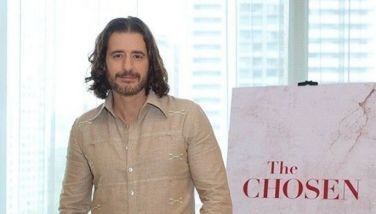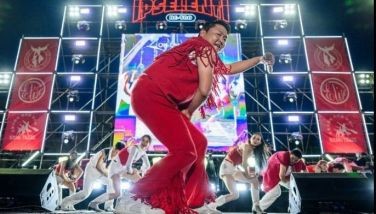Bai Ling: Who's that Girl?
Yes, who's that girl?
Hereabouts, maybe even those who have seen 20th Century Fox's Anna and the King, directed by Andy Tennant (Ever After, etc.) with Chow Yun-Fat and Jodie Foster reprising the roles played by Rex Harrison and Irene Dunne in the 1946 movie and Yul Brynner and Deborrah Kerr in the 1956 version, movie fans take a second, closer look at the Chinese actress with the gamin looks and, that's it, invariably ask, "Who's that girl?"
But in Hollywood and elsewhere, nobody asks that question; they know who she is: Bai Ling, cast as the ill-fated Tuptim, one of Siam's King Mongkut's concubines.
Bai Ling is the newest "Asian rage" in Hollywood, having appeared with impressive results in four films (Red Corner, Wild Wild West, Nixon and The Crow) before she tackled the Tuptim role that required her to part with her long-treasured long locks. Her performance in Red Corner (with Richard Gere) won for Bai Ling the prestigious 1997 Breakthrough Award from the National Board of Review and the Discovery Star of 1997 award given by the Hollywood's Women's Press Club's Golden Apple Awards.
She was born in the Szechwan province of The People's Republic of China and had her first exposure to acting at age 14 when she joined the Chinese Army, performing for soldiers in Tibet for three years, an experience that allowed her to hone her musical skills. Bai Ling later refined her craft at the Szechwan Theater Company where she caught the attention of both traditional and progressive Chinese directors. Her portrayal of a mentally-ill young woman in the Chinese drama Arc Light is considered a landmark in her acting career.
Now 28, Bai Ling recently became an American citizen. She lives in L.A.
In December last year, Conversations interviewed Bai Ling (along with Jodie Foster, Chow Yun-Fat and director Andy Tennant) at the Four Seasons Hotel in L.A. She was engaging, always smiling and a dream interviewee, answering all questions with charming willingness.
Excerpts:
How was it like working with Chow Yun-Fat as compared to working with Richard Gere in Red Corner, Will Smith in Wild, Wild West and (the late) Brandon Lee in The Crow?
"It will take hours to tell the whole story!"
In a few words.
"Richard Gere and I shared starring roles so I spent more time with him than I did with my other co-actors, so we had a wonderful time and a great experience. With Will Smith, it was fun, especially when we did that scene where I seduced him. He was very charming, like a child, very funny." (Forgetting to comment on Brandon Lee.)
What about Chow Yun-Fat?
"I don't have lots of scenes with Chow Yun-Fat but I'm impressed by his great presence. And he's very handsome! On the set, I watched and observed him a lot and I noticed that he worked very hard. Very professional."
Was it physically demanding and difficult playing Tuptim, considering that, besides shaving your head clean, you did a lot of "torture" scenes?
"It's a physically, emotionally and mentally difficult role. It was hard playing Tuptim and I actually cried during the shooting of the torture scenes. But it's worth it. Tuptim is a very good role."
Being Asian, did you identify with Tuptim (played by Rita Moreno, a Puerto Rican, in the 1956 The King and I)?
"Yes, I did! I heard her voice, I felt her heart beating. I felt like I was Tuptim."
Are you like that with every role you play? You know, get under the skin of the character.
"Yes. I play each role from inside my heart."
How did you prepare yourself for the role of Tuptim?
"I just tried to feel the role with my heart, just like I do with other roles."
Have you seen The King and I (Brynner-Kerr version)?
"I have. I like that movie!"
How did you portray the role in contrast to the performance of Rita Moreno?
"Oh, I never thought about that! All I think about is that she's a beautiful actress in that role. What I did was play Tuptim from my own heart; I was loyal to myself. I think every actress has her own individual qualities, each actress shapes the role in her own way."
Being now an American citizen, do you feel comfortable in America, specifically in Hollywood?
"I have a manager, a publicist and an agent and they make things easy for me. They are nice to me and they make me feel at home."
You're actually doing the reverse of what other Asian actors are doing. You know, making a name in Hollywood first before perhaps going back to China (or Hong Kong or Taiwan) to do movies there.
"This is business and I go where the shooting is. It doesn't matter whether in America or in China. I am an actress and I have to do my job."
What's the hard part of getting into Hollywood for an Asian like you?
(Thinking awhile) "Hardest part?"
Language barrier, perhaps?
"Not with me, of course, because I speak English. I can't think of any hardship."
Didn't you have any second thoughts about cutting your hair (for the Tuptim role)?
(Laughing) "Oh, I was pretty terrified! You see, I was wearing long hair all my life. When I was in China, I never cut it. But I cut it for Tuptim. When I read the script, I was moved by the story. I knew my instincts told me that I had to do this movie. Instincts are always right. My manager told me, 'You're shaving your hair, not your talent.' I said, 'Yeah, you're right.' I always think positively."
What did you do with your hair?
"It's sitting in my room. They made it into a wig for me."
How was it shooting the movie in Malaysia (with a 100-degree-Fahrenheit-plus sweltering temperature)?
"It was like I was wearing thick sweaters all the time; it was like burning! I felt sticky all the time. I felt like we were inside a microwave oven!"
What was your childhood like in China?
"My childhood? What I remember is that I couldn't meet my grandparents. You see, my parents had some problems during the Cultural Revolution. They were in trouble and they couldn't take care of me. They sent me to my grandmother and I was thankful to them for that because my grandmother had a courtyard and I had a fun time playing everyday, chasing the sheep and the dogs. I remember my grandmother always made me wear bright green and red clothes, very colorful, and she even hand-made my shoes."
How interesting!
"I told her, 'I don't like to wear them!' But she insisted, 'Colorful! It's okay! You must wear them!' I would run around and hide under the table while she waited holding the clothes and the shoes. Sometimes, I hid under the bed. So funny! When I grew, I had to apologize to my grandmother for not wearing those clothes and those shoes. I thought she was right. Very colorful clothes attract people."
Now you're wearing very different and very Western clothes (black leather-like sleeveless dress that highlighted her lithe figure).
"I'm wearing this for you to see and to admire!"
After Anna and the King, what film(s) are you doing?
"Hhhmmmm! I want to do comedy or something different. I'm reading some scripts but I haven't decided yet. This year (of the Dragon) will be a good year for me. I could feel that a big surprise is in store for me. I could feel that a big surprise is in store for me. Right now, I'm working on this TV show where I play a super sexy, smart and very dangerous cop who also kicks ass. I like the part because it's modern; she has terrific shape and tattoo on her face."
You got intro trouble with the Communist Chinese Government when you played an embattled lawyer in the anti-Communist movie Red Corner and you were even branded as a traitor. How did you feel about it?
(Laughing) "I don't like the rules. Personally, I don't like authority, I don't like the system."
Is there any rebel streak in you?
"Yeah, I think so!"
A rebel with a cause?
(Laughing some more) "Of course, of course!"
"There was a period in China during the Cultural Revolution when all the songs from Hong Kong, all the tapes, had to be surrendered to the office to be destroyed. Isn't it silly? It's true: The newspapers in China called me a traitor after I did Red Corner. I felt a bit sad and at the same time I was worried about my family back in China. Both my parents were university professors. My mother asked me, 'Why are you doing that?' I told her, 'When you see the movie, you will like it.' The newspapers said that I sold my country to get this (Hollywood) glory."
You were a member of the Red Guard (as part of a performance troop entertaining soldiers in Tibet) but you later joined the protest at Tiananmen Square in the early '90s. How are things in China now?
"I do think positively about things. I think China has changed a lot; I'm still very optimistic. The people and the government officials are undergoing a lot of sacrifices for the changes."
Have you gone back to China since you left?
"Actually, I went back in October last year to see my grandmother. My aunt called me, 'Your grandmother misses you terribly,' so I decided to visit her. I didn't tell anybody; I just got on the plane to China. Everyday I cooked for my grandmother. We talked. We told stories. Sometimes, I just held her hand and said nothing. China, as I've said, is changing tremendously. It's like an old man just waking up, already taking one step out the door, walking toward the sunrise."
Weren't there any, well, arrest "feelers?"
"Basically, I went there for a good reason and everything worked well for me. Somebody must have protected me but I don't know who. I don't know who to thank. I think it's the Chinese authorities for allowing me to go home. I didn't have any problems at all."
You consider yourself some kind of a free spirit?
"You're right! Sometimes, I feel like I'm an air, just going on, wondering. When I feel like a human again, I tell myself, 'I'm wondering; I don't like this!' Even now that I'm living in America (L.A.), I feel like I was out in a political place where I don't belong. I don't want to be one of the dissidents here. I love my country. I love China."
Have you been to any other Asian country aside from Malaysia?
"I went to Bangkok and I went to the palace where the king lives. I was amazed at how (the producers of Anna and the King) were able to build an exact replica of the palace on the set in Malaysia. I said, 'Wow!' Beautiful palace."
Did you like Bangkok?
"Oh, it's a fascinating place. They have monks there. They have, you know, prostitution going on there. I went around with my bald head exposed and saw the red-light district (Patpong). I walked on the streets and people looked at me. I could see in their eyes that they thought I was dirty. They must have wondered, 'What is this monk doing in a place like this?' It was funny."
Didn't they recognize you?
"No, they did not. They were just wondering."
Did you have a fun time working in Malaysia?
"Oh, I did! Never mind if it was hot. Unlike in Bangkok, most people in Malaysia spoke English. I'm glad I can speak English well now. When I went to America, I didn't speak English at all and I learned the language from my friends and neighbors. Always, I asked them to speak to me in English. At a New York University film school where I studied, I told everyone, 'Speak to me in English!' So even when we were having meals at the cafeteria, everybody was speaking English to me."
Do you advise your fellow artists in China to learn English before aspiring for Hollywood?
"I should say so. Actors from Mainland China couldn't work in America because they couldn't speak English, unlike actors from Hong Kong who speak English."
If you were to play a woman from Chinese History, who
(Thinking and thinking) "Let me see."
Madame Chiang Kai Sek?
(Eyes lighting up) "Yeah, that's interesting character! Good suggestion, good suggestion! I can do that but the only problem is that it will be very difficult to shoot in China because she's a very complex person."
- Latest
- Trending



























